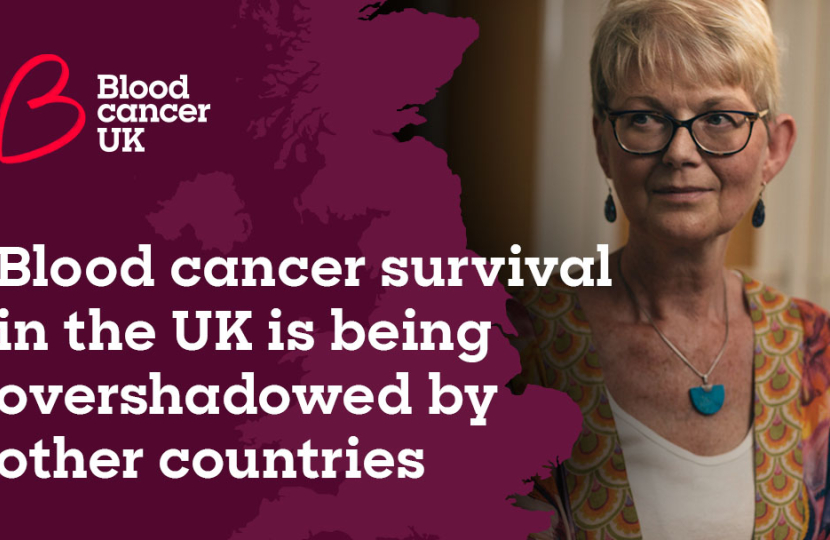
Blood cancer is a type of cancer that affects your blood cells. Over 40,000 people are diagnosed with a blood cancer each year in the UK, and over 250,000 people are currently living with or are in remission from blood cancer. Every year, more than 15,000 people die of blood cancers.
There are over 100 different types of blood cancer, including: leukaemia; lymphoma; myeloma; myelodysplastic syndromes (MDS) and myeloproliferative neoplasms (MPN). They each have different symptoms, treatments and prognoses.
Investment in blood cancer research by Blood Cancer UK and others has been transformational over the past 60 years in ensuring more people are living longer.
Innovative treatments are being developed which, if made available in the UK, could revolutionise blood cancer care further. However, the stark reality is that too many people are still dying from blood cancer, and the UK is now falling behind similar countries when it comes to research, outcomes and survival.
As a blood cancer community, Blood Cancer UK wanted to understand why many people are still dying from blood cancer, and the experiences and priorities of people living with blood cancer and the people working in the NHS who provide their care and treatment.
The research they commissioned analysed blood cancer survival in the UK in comparison to other countries with similar health and wealth systems. Shockingly, it revealed that:
- More than one million years of life have been lost to blood cancer over a decade.
- The likelihood of someone surviving their blood cancer depends on their background, education and where they live.
- For each blood cancer type, UK survival rates trail behind those of comparable nations with similar wealth and healthcare systems.
As a result of their research, Blood Cancer UK have developed an Action Plan outlining the action that needs to be taken to improve survival in the UK.
This is made up of 17 recommendations for governments, NHS, charities, the pharmaceutical industry and others to improve treatment and care in the UK.
The recommendations focus around workforce future-proofing, swifter diagnosis of blood cancer, the best care for blood cancer patients, equal access to trials and treatments, and data sharing.
Cancer is cancer and every patient, no matter what type of cancer they are diagnosed with, deserves access to services and treatments which are going to provide them with the very best outcome.
The launch of their Action Plan coincides with Blood Cancer Awareness Month . Each year September turns red as the spotlight is put firmly on blood cancer and the impact it has on our communities and the urgent need for more action.
Blood cancer symptoms include:
- Weight loss that is unexplained
- Bruising or bleeding that is unexplained
- Lumps or swellings
- Shortness of breath (breathlessness)
- Drenching night sweats
- Infections that are persistent, recurrent or severe
- Fever (38°C or above) that is unexplained
- Rash or itchy skin that is unexplained
- Pain in your bones, joints or abdomen (stomach area)
- Tiredness that doesn’t improve with rest or sleep (fatigue)
- Paleness (pallor)
Because the symptoms can be linked to other health issues, diagnosing blood cancer is often difficult without a blood test.
If you have just one symptom that you can't explain, that goes on for a long time, or is unusual for you, book an appointment with your GP. If you suddenly feel very unwell at any time, get medical help straight away by calling 999 or going to A&E.
For further information, visit Blood cancer symptoms and signs | Blood Cancer UK



